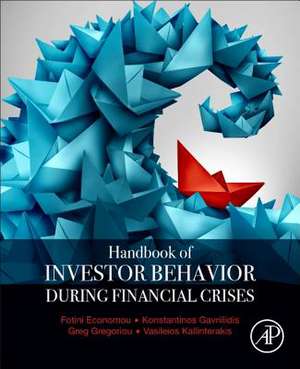Handbook of Investors' Behavior during Financial Crises
Editat de Fotini Economou, Konstantinos Gavriilidis, Greg N. Gregoriou, Vasileios Kallinterakisen Limba Engleză Paperback – 26 iun 2017
- Encompasses empirical, quantitative and regulation-motivated studies
- Includes information about retail and institutional investor behavior
- Analyzes optimal financial structures for the development and growth of specific regional economies
Preț: 581.13 lei
Preț vechi: 761.68 lei
-24% Nou
Puncte Express: 872
Preț estimativ în valută:
111.21€ • 115.68$ • 91.81£
111.21€ • 115.68$ • 91.81£
Carte tipărită la comandă
Livrare economică 08-22 aprilie
Preluare comenzi: 021 569.72.76
Specificații
ISBN-13: 9780128112526
ISBN-10: 0128112522
Pagini: 514
Dimensiuni: 191 x 235 x 30 mm
Editura: ELSEVIER SCIENCE
ISBN-10: 0128112522
Pagini: 514
Dimensiuni: 191 x 235 x 30 mm
Editura: ELSEVIER SCIENCE
Public țintă
Upper-division undergraduates, graduate students, and professionals studying and working in financial economics, financial markets, behavioral finance, and regional economicsCuprins
SECTION A: theoretical perspectives of investors’ behaviour during financial crises
1. Debt Markets, Financial Crises and Public Finance in the Eurozone: Action, Structure and Experience in Greece
2. Investor Behavior Before, and After the Financial Crisis: From a Muted Response to an Increased Risk Appetite
3. Optimal Bubble Exit Strategies
4. Solving the Viner-Hayek Controversy - Financial Crises and the Conflicting Worlds of Deductive and İnductive Game Theory
5. Governing Financial Orders Which Have Been Grown and Not Made: The Origins of the Financial Crisis in Financial Gridlock
6. Overconfidence in Finance: Overview and Trends
7. Rational Agents and Irrational Bubbles
8. The Similarities Between the Bulgarian Local Financial Crisis in 1997 and the Global Financial Crisis in 2008
SECTION B: Empirical Evidence On Investors’ Behaviour During Financial Crises
9. Herding, Volatility and Market Stress in the Spanish Stock Market
10. Did Security Analysts Overreact during the Global Financial Crisis? New Insights
11. The Determinants of U.S. Bank Failures During 2008-2010
12. Financial Crises and Herd Behavior: Evidence from Borsa Istanbul
13. Doctor Jekyll and Mr. Hide: Stress Testing of the Investor Behavior
14. Market Sentiment and Contagion in Euro-Area Bond Markets
15. Regime Switching on the Relationship Between Stock Returns and Currency Values: Evidence From the 1997 Asian Crisis
16. Relationship Between illiquidity and Monetary Conditions in the United Kingdom
17. Herding in the Athens Stock Exchange During Different Crisis Periods
18. Beta herding in emerging stock markets
19. Exchange-Traded Funds: Do They Promote or Depress Noise Trading?
20. The Behavior of Online Individual Investors before and after the 2007 Financial Crisis: Lessons from the French Case
SECTION C: Behavioural Trading Strategies During Financial Crises
21. Simple Tactical Asset Allocation Strategies on the S&P 500 and the Impact of VIX Fluctuations
22. Horizontal and Natural Visibility Graph Analysis of S&P 500 Index time series
23. Illiquidity as an Investment Style During the Financial Crisis in the United Kingdom
24. On The Pricing of Commonality Across Various Liquidity Proxies in the London Stock Exchange and The Crisis
1. Debt Markets, Financial Crises and Public Finance in the Eurozone: Action, Structure and Experience in Greece
2. Investor Behavior Before, and After the Financial Crisis: From a Muted Response to an Increased Risk Appetite
3. Optimal Bubble Exit Strategies
4. Solving the Viner-Hayek Controversy - Financial Crises and the Conflicting Worlds of Deductive and İnductive Game Theory
5. Governing Financial Orders Which Have Been Grown and Not Made: The Origins of the Financial Crisis in Financial Gridlock
6. Overconfidence in Finance: Overview and Trends
7. Rational Agents and Irrational Bubbles
8. The Similarities Between the Bulgarian Local Financial Crisis in 1997 and the Global Financial Crisis in 2008
SECTION B: Empirical Evidence On Investors’ Behaviour During Financial Crises
9. Herding, Volatility and Market Stress in the Spanish Stock Market
10. Did Security Analysts Overreact during the Global Financial Crisis? New Insights
11. The Determinants of U.S. Bank Failures During 2008-2010
12. Financial Crises and Herd Behavior: Evidence from Borsa Istanbul
13. Doctor Jekyll and Mr. Hide: Stress Testing of the Investor Behavior
14. Market Sentiment and Contagion in Euro-Area Bond Markets
15. Regime Switching on the Relationship Between Stock Returns and Currency Values: Evidence From the 1997 Asian Crisis
16. Relationship Between illiquidity and Monetary Conditions in the United Kingdom
17. Herding in the Athens Stock Exchange During Different Crisis Periods
18. Beta herding in emerging stock markets
19. Exchange-Traded Funds: Do They Promote or Depress Noise Trading?
20. The Behavior of Online Individual Investors before and after the 2007 Financial Crisis: Lessons from the French Case
SECTION C: Behavioural Trading Strategies During Financial Crises
21. Simple Tactical Asset Allocation Strategies on the S&P 500 and the Impact of VIX Fluctuations
22. Horizontal and Natural Visibility Graph Analysis of S&P 500 Index time series
23. Illiquidity as an Investment Style During the Financial Crisis in the United Kingdom
24. On The Pricing of Commonality Across Various Liquidity Proxies in the London Stock Exchange and The Crisis
Recenzii
"Financial crises are extraordinarily complex, necessarily involving a huge number of elements. This volume contributes to our understanding of this complexity by cleverly addressing a substantial range of the contributing factors and behaviours. The editors have picked contributions to provide an excellent reminder that we should not oversimplify our understanding of how events evolve, and how regulators, markets and investors tackle them." --Mardi Dungey, University of Tasmania
"This book provides a collection of papers in the area of behavioral finance. It is an excellent reference tool for anyone interested in the latest and exclusive research on investor behavior during different turbulent periods and across several market structures and asset classes." --Dimitris Kenourgios,National and Kapodistrian University of Athens
"This book provides a collection of papers in the area of behavioral finance. It is an excellent reference tool for anyone interested in the latest and exclusive research on investor behavior during different turbulent periods and across several market structures and asset classes." --Dimitris Kenourgios,National and Kapodistrian University of Athens






